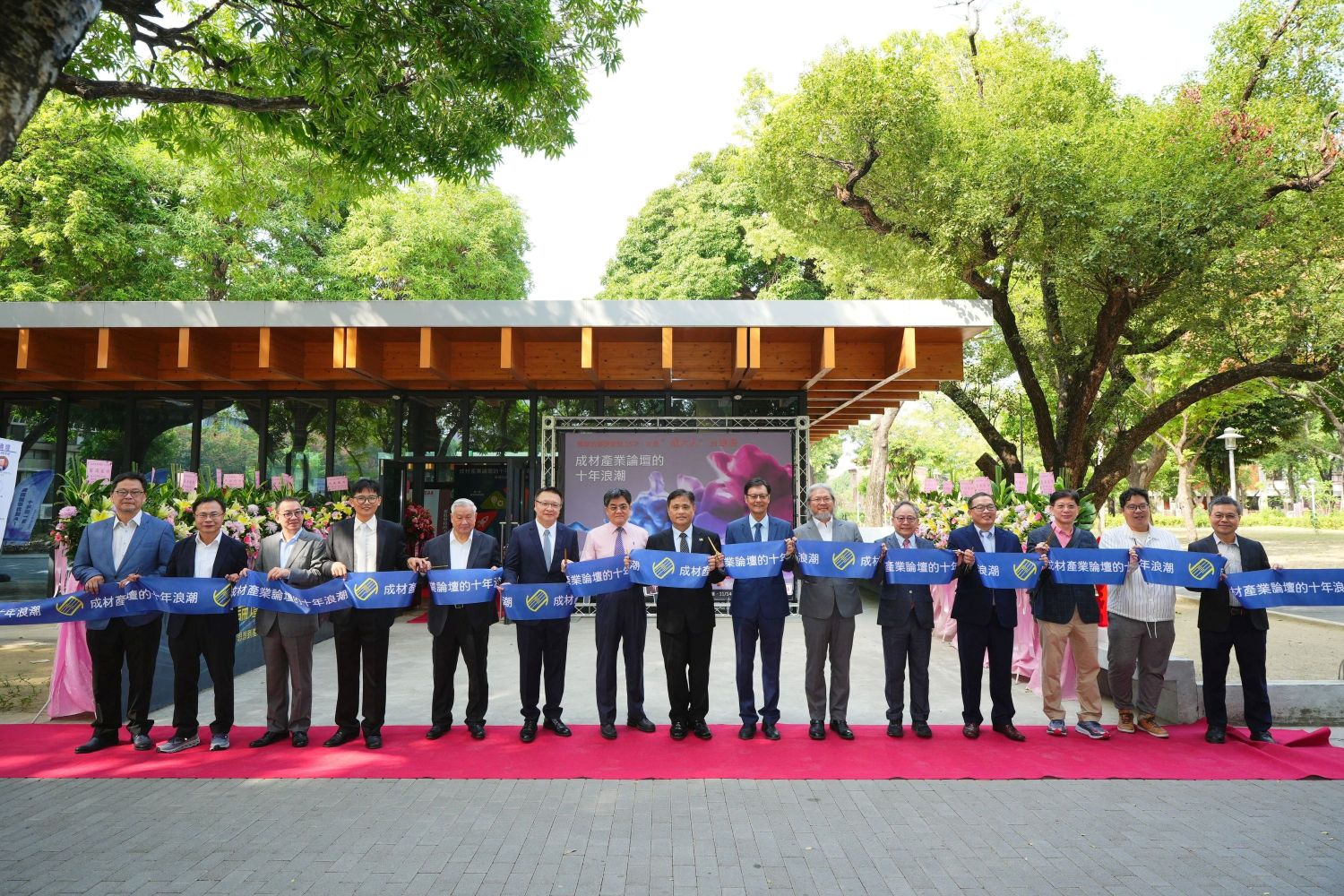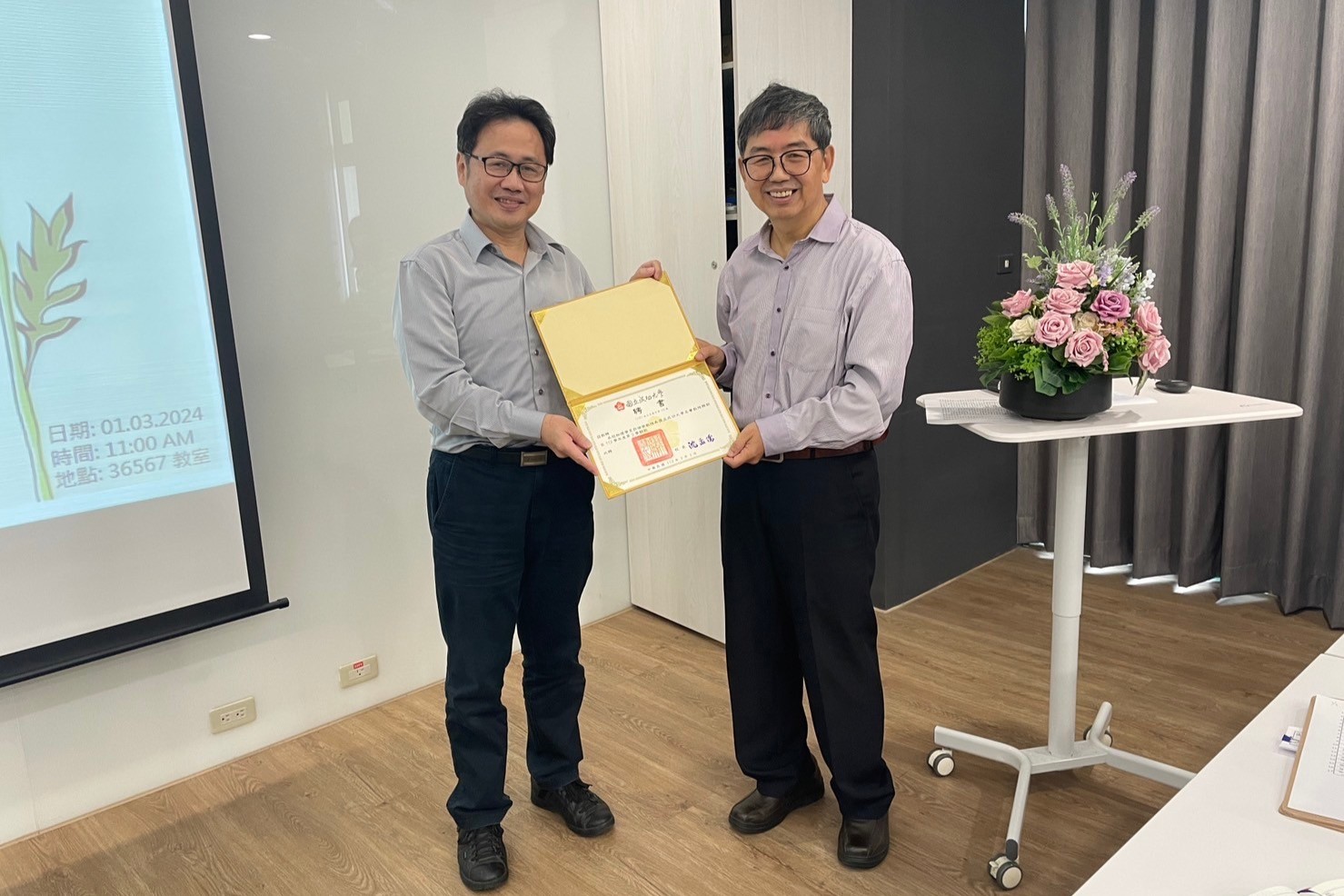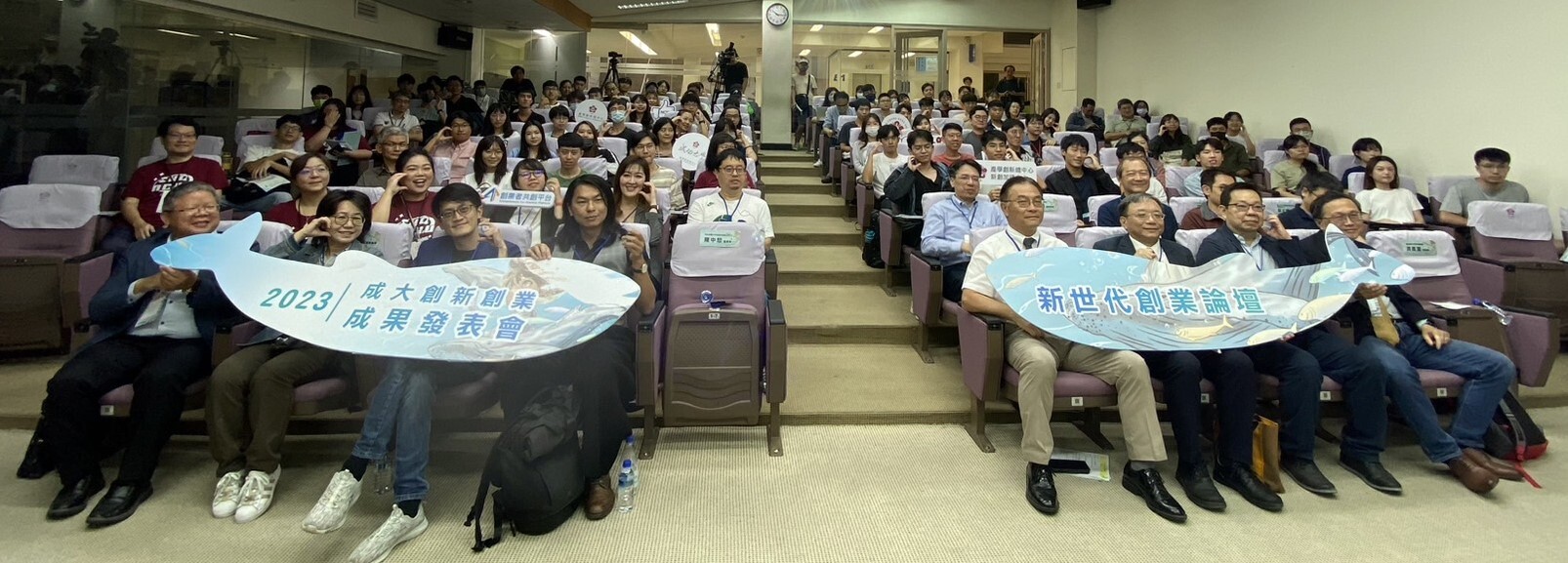In the inaugural address, President Ching-Te Lai emphasized Taiwan’s commitment to entering the global space industry. National Cheng Kung University (NCKU), with its strong foundation in computer science and solid research in aerospace-related fields, held the "2024 NCKU Aerospace Industry Forum" on June 27 at the Macronix Hall, Sheng-Li Campus. The forum invited distinguished alumni from the aerospace and defense industries, including Academia Sinica Academician Yu-Pen Su and former Director of the Missile and Rocket Systems Research Division at NCSIST, Zheng-Shan Guo, to discuss "Pioneering Space Technologies and the Prospects of Taiwan's Aerospace Industry." Macronix Chairman Miin Wu also shared insights on "Macronix's Contributions to the Aerospace Industry." As the global space industry continues to thrive, NCKU hopes to encourage more faculty and students to actively engage in related academic and research pursuits.
President Meng-Ru Shen highlighted in his speech that alumni are NCKU's greatest asset, and another significant asset is the university’s pivotal role in national key technologies, with aerospace being one of them. He emphasized that universities are centers of knowledge, where professors impart knowledge and conduct research to generate new insights. Universities also serve as platforms for industry, government, academia, and research sectors to exchange ideas, ensuring that the knowledge and technology produced meet real-world needs rather than remaining confined to academia. This aligns with the university's mission to engage in cutting-edge research.
The "2024 NCKU Aerospace Industry Forum" was organized by the NCKU Alumni Relations Center, with the Department of Aeronautics and Astronautics, Hsia Hann-Ming Space Technology Center, and Wong Tsoo Systems Engineering Research Center as co-organizers. The forum was chaired by the Director of the Department of Aeronautics and Astronautics, Shau-Shiun Jan. The event saw enthusiastic participation, with faculty and students from the fields of science, engineering, and aerospace attending, alongside prominent industry figures, including Catcher Technology Chairman Shuei-Shu Hung, Qisda Technology Chairman Qi-Hong Chen, and Cyntec Vice President of R&D Qing-Zhang Lin.
Academician Yu-Pen Su, an alumnus from the Department of Mechanical Engineering, class of 1970, delivered a talk on "Exploring the Frontiers of Aerospace Technology: Hypersonic Vehicles," offering an accessible introduction to the theories, historical development, and current status of hypersonic technologies. He discussed the potential benefits of developing hypersonic vehicles, highlighting their transformative impact on transportation, defense, exploration, and technology, making it a focal point for governments, research institutions, and related industries.
Zheng-Shan Guo, a 1981 alumnus from the Department of Naval Architecture, and former Director of the Missile and Rocket Systems Research Division at NCSIST, also gave a speech on "Exploring the Frontiers of Aerospace Technology: Hypersonic Vehicles." He provided an overview of the current booming aerospace industry, key historical turning points that have driven industrialization, the number of launch vehicles produced by various countries, and the development of Taiwan's space industry. He noted that many everyday products, such as reverse osmosis water filters, canned food, disposable diapers, and Velcro, were initially designed to meet the needs of astronauts.
Hao-Ji Zhang, a 1981 alumnus from the Department of Mechanical Engineering and Director of the Space Transportation System Development at the Taiwan Space Agency, discussed the "Planning and Development Status of the Orbital Rocket Program under the Revised Phase III National Space Program." He emphasized that southern Taiwan will be a key region for future national space development, particularly for orbital rockets, and that research and development in this area will require expertise in mechanical, electrical, physical, chemical, materials, legal, and political sciences. NCKU, as a comprehensive university, possesses the necessary research and human resources, and future collaborations between the two entities are expected to become increasingly close.
Professor Bing-Chih Chen from the Department of Physics and Director of the Hsia Hann-Ming Space Technology Center, presented on "How Universities Can Engage in the Industrial Revolution of the Space Age." He pointed out that almost every department in science and engineering at universities has the potential to play a role in the space sector. By enhancing curriculum design, promoting frontier research, fostering industry-academia collaboration, and engaging in international cooperation, universities can significantly contribute to the space industry.
Miin Wu, Chairman of Macronix and an alumnus from the Department of Electrical Engineering, class of 1970, shared Macronix's involvement and contributions to the aerospace industry. He explained that flash memory is used in many areas of space exploration. The European Space Agency has tested flash memory from major international manufacturers, and Macronix's high-quality products lead the global market. Their superior performance includes top radiation resistance and the ability to withstand extreme temperatures (-55°C & 135°C). Macronix is committed to continuous technological innovation, providing advanced and reliable memory solutions for the aerospace industry, contributing to humanity's dream of exploring the universe.
Speaker Biographies:
Yu-Pen Su: During his tenure at the National Chung-Shan Institute of Science & Technology (NCSIST), Academician Su led several programs that laid the foundation for Taiwan's missile systems, such as the Sky Bow I, Hsiung Feng III, Hsiung Feng II, Hsiung Feng IIE, and Wan Chien missiles, enhancing national defense capabilities. He received NCKU's Outstanding Alumni Achievement Award in 2022 and an Honorary Doctorate in Engineering from NCKU in 2023.
Zheng-Shan Guo: Guo has been involved in missile research at NCSIST for approximately 40 years, holding positions such as Assistant Researcher, Researcher, Chief Project Engineer, Group Leader, and Deputy Director. He led the Missile Systems Research Division to win the Five-Star Gold Award at Taiwan’s Continuous Improvement Competition.
Hao-Ji Zhang: Zhang has extensive experience in satellite attitude and orbit control system design and has participated in several missile development projects. His expertise includes missile/rocket systems engineering, missile/rocket/satellite navigation, guidance, flight control, missile/rocket flight dynamics, and real-time closed-loop simulation.
Bing-Chih Chen: Professor Chen specializes in astronomical observation, atmospheric electricity, space and astronomical instrumentation, and lightning physics. He also serves as the Director of the NCKU Institute of Space and Plasma Sciences.
Miin Wu: Wu founded Macronix, a global leader in non-volatile memory integrated circuits. He received the NCKU Outstanding Alumni Achievement Award in 2002 and an Honorary Doctorate in 2016. Wu also established the Miin Wu School of Computing at NCKU, pioneering AI innovation and interdisciplinary talent development in Taiwan.
President Meng-Ru Shen highlighted in his speech that alumni are NCKU's greatest asset, and another significant asset is the university’s pivotal role in national key technologies, with aerospace being one of them. He emphasized that universities are centers of knowledge, where professors impart knowledge and conduct research to generate new insights. Universities also serve as platforms for industry, government, academia, and research sectors to exchange ideas, ensuring that the knowledge and technology produced meet real-world needs rather than remaining confined to academia. This aligns with the university's mission to engage in cutting-edge research.
The "2024 NCKU Aerospace Industry Forum" was organized by the NCKU Alumni Relations Center, with the Department of Aeronautics and Astronautics, Hsia Hann-Ming Space Technology Center, and Wong Tsoo Systems Engineering Research Center as co-organizers. The forum was chaired by the Director of the Department of Aeronautics and Astronautics, Shau-Shiun Jan. The event saw enthusiastic participation, with faculty and students from the fields of science, engineering, and aerospace attending, alongside prominent industry figures, including Catcher Technology Chairman Shuei-Shu Hung, Qisda Technology Chairman Qi-Hong Chen, and Cyntec Vice President of R&D Qing-Zhang Lin.
Academician Yu-Pen Su, an alumnus from the Department of Mechanical Engineering, class of 1970, delivered a talk on "Exploring the Frontiers of Aerospace Technology: Hypersonic Vehicles," offering an accessible introduction to the theories, historical development, and current status of hypersonic technologies. He discussed the potential benefits of developing hypersonic vehicles, highlighting their transformative impact on transportation, defense, exploration, and technology, making it a focal point for governments, research institutions, and related industries.
Zheng-Shan Guo, a 1981 alumnus from the Department of Naval Architecture, and former Director of the Missile and Rocket Systems Research Division at NCSIST, also gave a speech on "Exploring the Frontiers of Aerospace Technology: Hypersonic Vehicles." He provided an overview of the current booming aerospace industry, key historical turning points that have driven industrialization, the number of launch vehicles produced by various countries, and the development of Taiwan's space industry. He noted that many everyday products, such as reverse osmosis water filters, canned food, disposable diapers, and Velcro, were initially designed to meet the needs of astronauts.
Hao-Ji Zhang, a 1981 alumnus from the Department of Mechanical Engineering and Director of the Space Transportation System Development at the Taiwan Space Agency, discussed the "Planning and Development Status of the Orbital Rocket Program under the Revised Phase III National Space Program." He emphasized that southern Taiwan will be a key region for future national space development, particularly for orbital rockets, and that research and development in this area will require expertise in mechanical, electrical, physical, chemical, materials, legal, and political sciences. NCKU, as a comprehensive university, possesses the necessary research and human resources, and future collaborations between the two entities are expected to become increasingly close.
Professor Bing-Chih Chen from the Department of Physics and Director of the Hsia Hann-Ming Space Technology Center, presented on "How Universities Can Engage in the Industrial Revolution of the Space Age." He pointed out that almost every department in science and engineering at universities has the potential to play a role in the space sector. By enhancing curriculum design, promoting frontier research, fostering industry-academia collaboration, and engaging in international cooperation, universities can significantly contribute to the space industry.
Miin Wu, Chairman of Macronix and an alumnus from the Department of Electrical Engineering, class of 1970, shared Macronix's involvement and contributions to the aerospace industry. He explained that flash memory is used in many areas of space exploration. The European Space Agency has tested flash memory from major international manufacturers, and Macronix's high-quality products lead the global market. Their superior performance includes top radiation resistance and the ability to withstand extreme temperatures (-55°C & 135°C). Macronix is committed to continuous technological innovation, providing advanced and reliable memory solutions for the aerospace industry, contributing to humanity's dream of exploring the universe.
Speaker Biographies:
Yu-Pen Su: During his tenure at the National Chung-Shan Institute of Science & Technology (NCSIST), Academician Su led several programs that laid the foundation for Taiwan's missile systems, such as the Sky Bow I, Hsiung Feng III, Hsiung Feng II, Hsiung Feng IIE, and Wan Chien missiles, enhancing national defense capabilities. He received NCKU's Outstanding Alumni Achievement Award in 2022 and an Honorary Doctorate in Engineering from NCKU in 2023.
Zheng-Shan Guo: Guo has been involved in missile research at NCSIST for approximately 40 years, holding positions such as Assistant Researcher, Researcher, Chief Project Engineer, Group Leader, and Deputy Director. He led the Missile Systems Research Division to win the Five-Star Gold Award at Taiwan’s Continuous Improvement Competition.
Hao-Ji Zhang: Zhang has extensive experience in satellite attitude and orbit control system design and has participated in several missile development projects. His expertise includes missile/rocket systems engineering, missile/rocket/satellite navigation, guidance, flight control, missile/rocket flight dynamics, and real-time closed-loop simulation.
Bing-Chih Chen: Professor Chen specializes in astronomical observation, atmospheric electricity, space and astronomical instrumentation, and lightning physics. He also serves as the Director of the NCKU Institute of Space and Plasma Sciences.
Miin Wu: Wu founded Macronix, a global leader in non-volatile memory integrated circuits. He received the NCKU Outstanding Alumni Achievement Award in 2002 and an Honorary Doctorate in 2016. Wu also established the Miin Wu School of Computing at NCKU, pioneering AI innovation and interdisciplinary talent development in Taiwan.
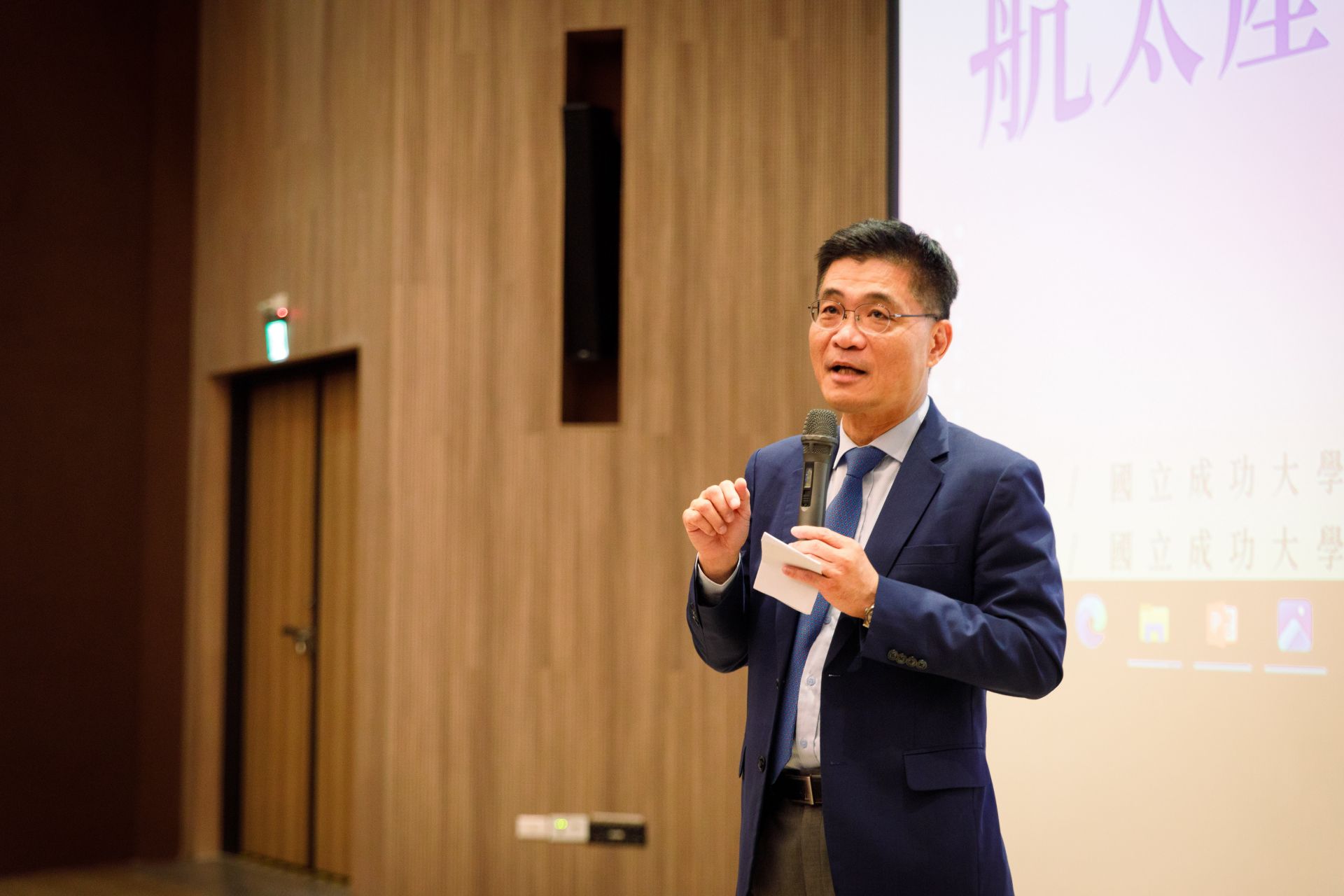
President Shen Meng-Ru emphasizes that the university is a hub of knowledge; the knowledge and technology produced must address real-world needs
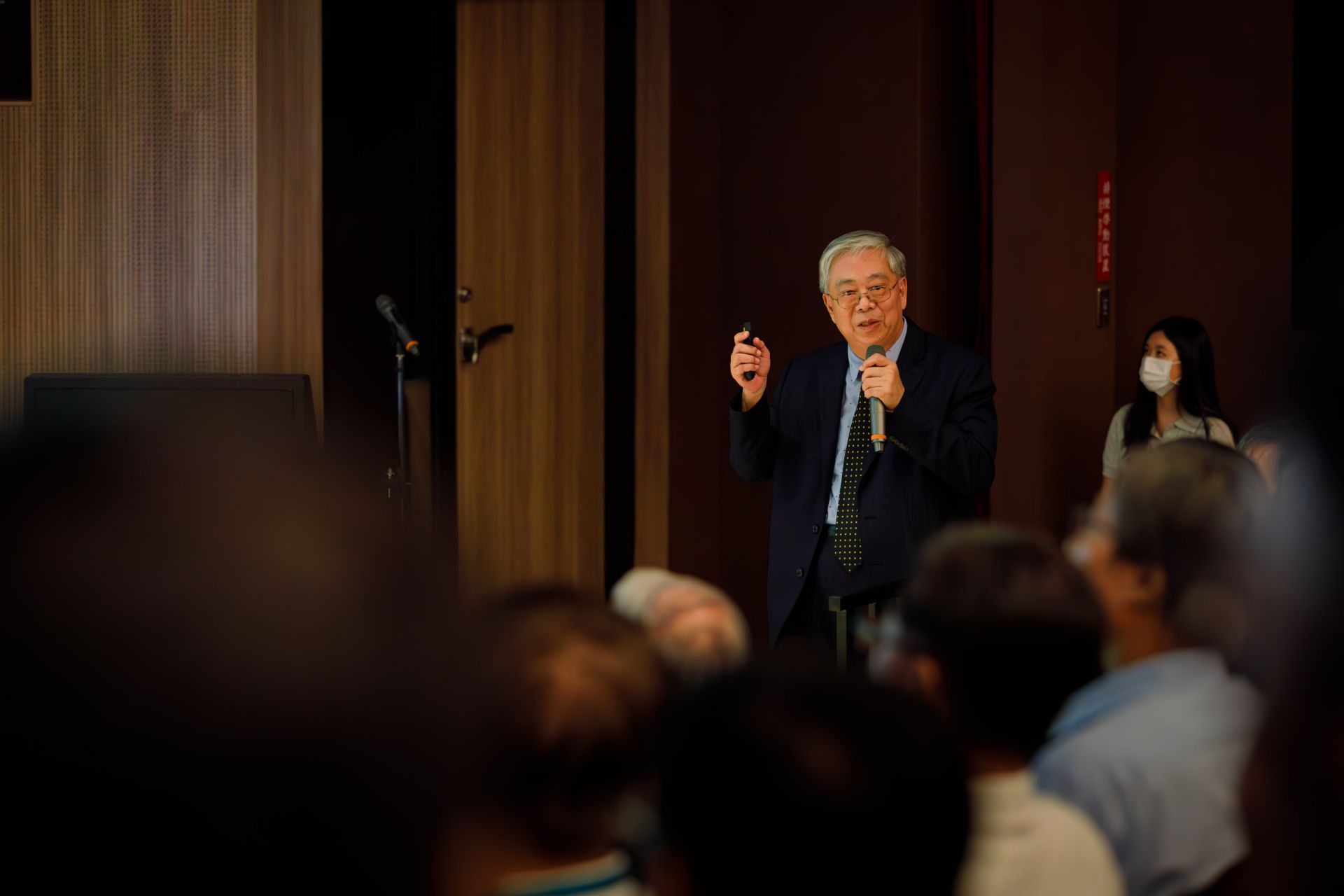
Academician Su Yu-Ben provides an accessible introduction to hypersonic theory, its history, and development
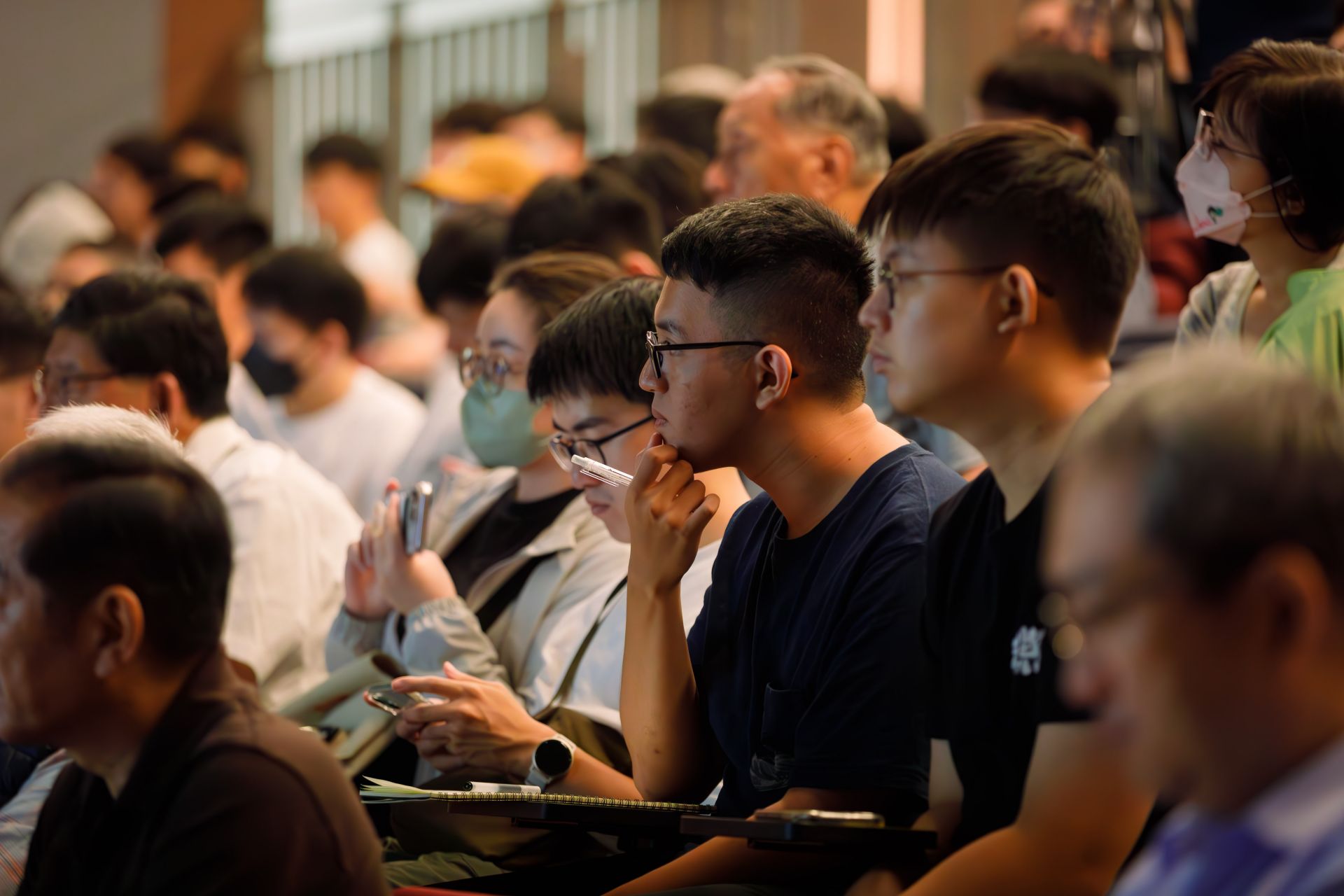
Attentive listening by participants including faculty and students
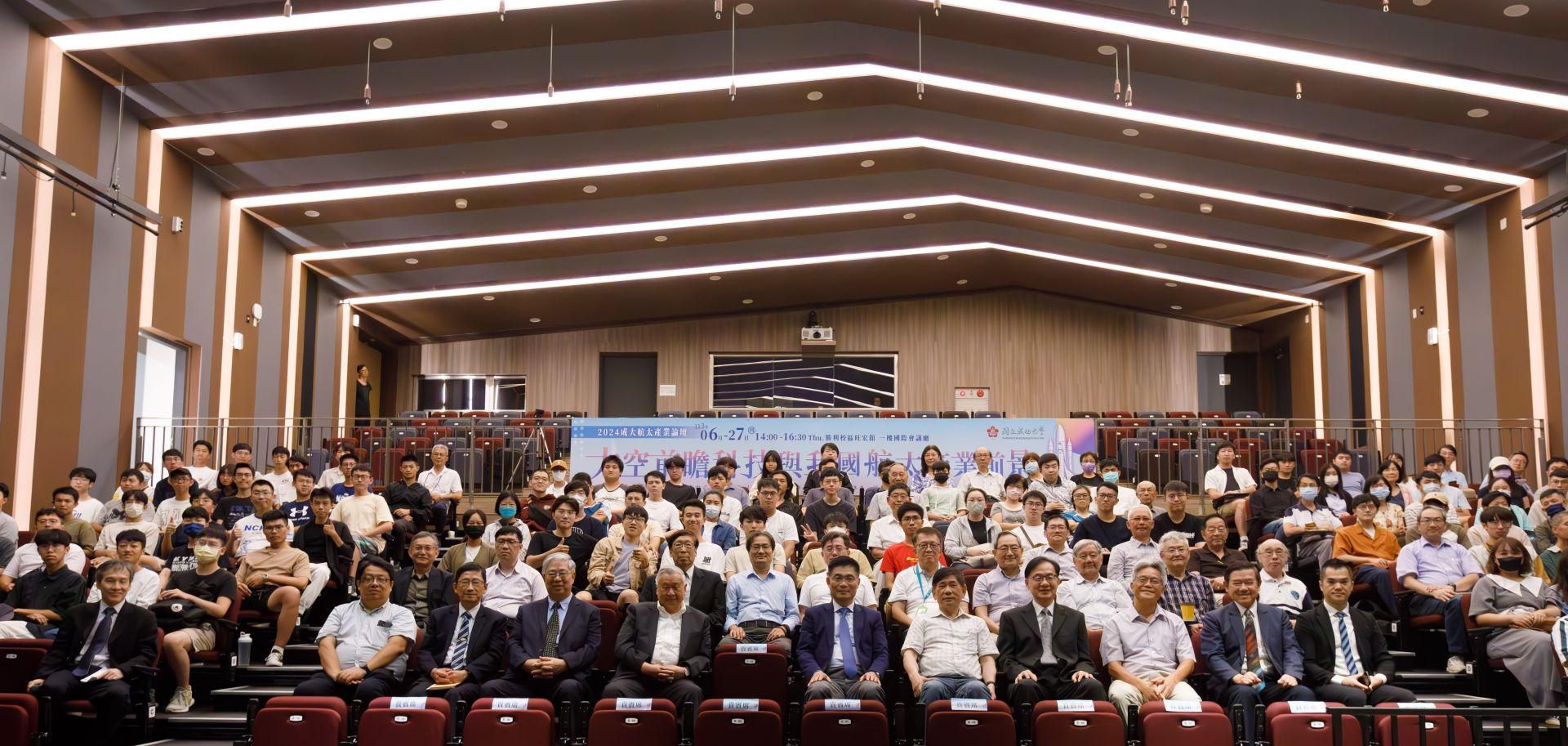
The group photo of forum attendees





